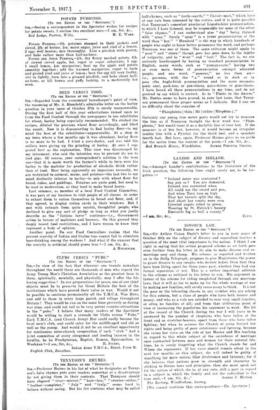BEER VERSUS FOOD.
(To ran Emma or THE " Eleeernes.") Sin.—Regarded from the economical housekeeper's point of view, the reasoning of Mr. A. Blomfield's admirable letter on the barley question in your issue of October 27th is surely unanswerable. During the first half of this year exhortations rained upon us from the Food Control through the newspapers to use substitutes for wheat, barley being especially recommended. We studied the recipes, diluted the precious wheat flour accordingly, and liked the result. Now it is disconcerting to find barley flour—to my mind the best of the substitutes—unprocurable. At a shop in my town where a few months ago it was abundant, barley flour is no more to be had. I tried a corn-dealer, and was told the millers were giving up the grinding of barley. At once I sug- gested beer as the explanation. This view was discouraged by my informant, who said the intention was to prevent its use to feed pigs. Of course, your correspondent's: solution is the true one—that it is made worth the farmer's while to turn over his barley to the maltster for production of alcoholic drink rather than of food. Beer being apparently an imperious necessity, we are restricted to oatmeal, melee, and potatoes—the last two to my mind distinctly inferior to barley—to mix with wheat flour for bread, cakes, and puddings. Potatoes are quite good, but need to be used in moderation, as they tend to make bread heavy.
Last summer, as member of a local Food Control Committee, it was part of my business to visit people of all classes in order to exhort them to ration themselves in bread and flour, and, if they agreed, to display ration cards in their windows. But I met with refusals from quite careful, thoughtful people, who declined to give any sort of pledge so long as what you justly describe as the "furious farce" continues—i.e., Government action in favour of maltsters and brewers. On this ground they deeply resent food restrictions, and I have reason to know they represent a body of opinion.
Another point. Do our Food Controllers realise that the present scarcity of Indian and Ceylon teas cannot fail to stimulate beer-drinking among the workers ? And what if the rumour that the scarcity is artificial should prove true P—I am. Sir, Re.,
A Hoosewrra














































 Previous page
Previous page